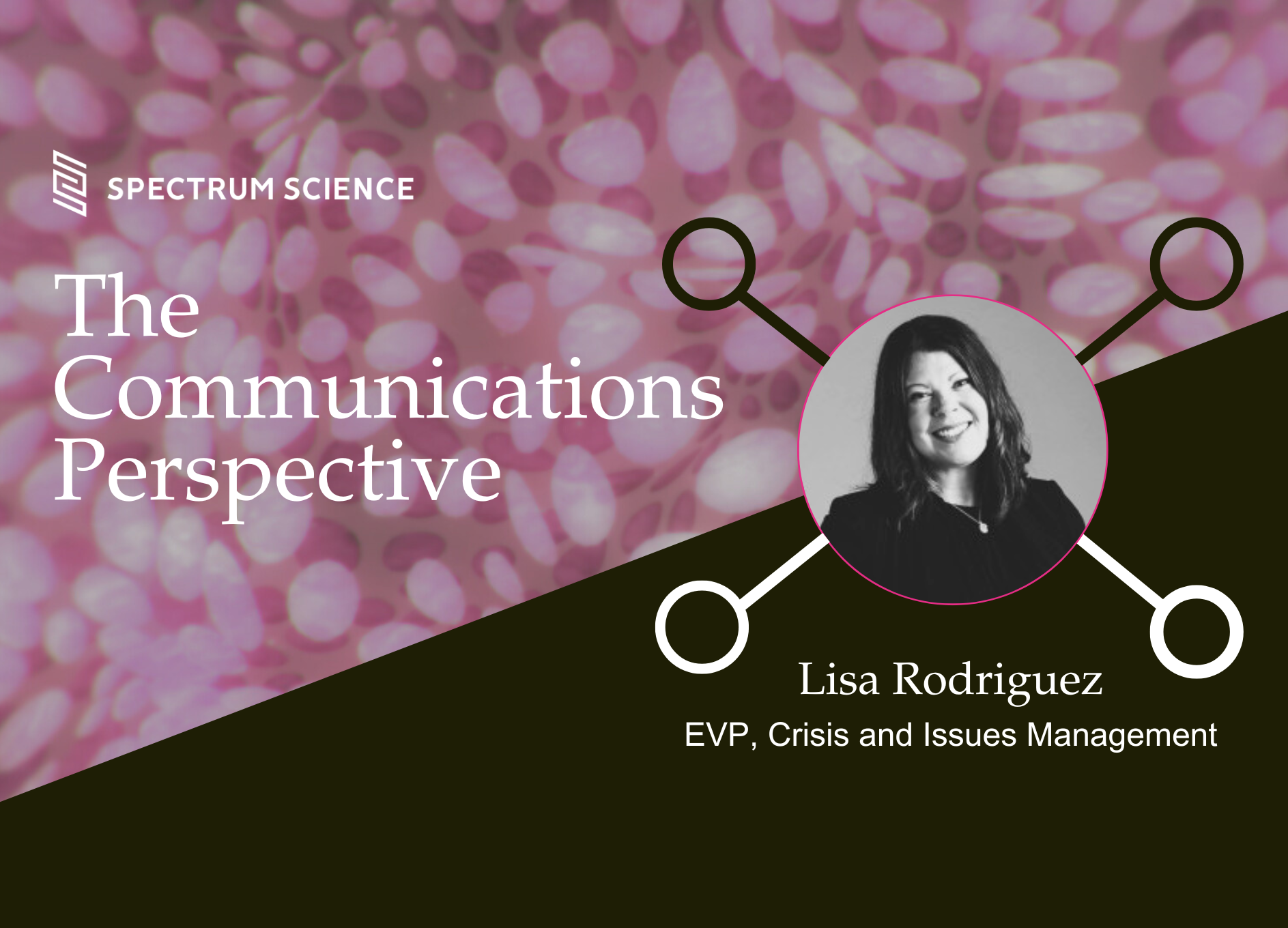Communications
The Communications Perspective: Proactive Reputation Management to Prevent Crisis

In today’s fast-moving world, a company’s reputation is one of its most valuable assets—and one of its most vulnerable. Whether navigating regulatory shifts, public scrutiny or unexpected crises, organizations must be prepared to respond swiftly and strategically to protect their credibility. Proactive reputation management isn’t just about reacting when issues arise—it’s about planned preparedness that you can start implementing now.
We sat down with Lisa Rodriguez, EVP of Crisis and Issue Communications at Spectrum Science, to discuss how organizations can strengthen their crisis preparedness.
- Spectrum Science is built on a commitment to integrating science, strategy and storytelling. Tell us about your role and share how it helps bridge these areas to create an impact.
I started my career as a journalist, and while I quickly transitioned to agency PR, I’ll always closely identify with my inner Lois Lane! I credit the newsroom as my training ground for operating in high-stakes, fast-moving environments where focus on the details, responsiveness, and the ability to pivot quickly are critical. At Spectrum, I use these skills to help clients navigate complex, ever-changing landscapes, whether it’s breakthrough innovation, regulatory shifts, or a full-blown crisis. Just like in journalism, success comes down to being prepared for anything, gathering the right information and sources like your life depends on it, and staying calm under pressure.
- What are the biggest challenges companies face when managing a crisis?
The biggest challenge is the unknown. While it is relatively easy to scenario plan based on known business and industry risk factors, it is incredibly hard to predict the specific issue that will arise, how the public will react to it, and how much damage it will do to an organization’s reputation.
- How does preparation impact the success of crisis communications?
Just like any emergency, the ability to contain and neutralize a situation before irreparable damage is done is almost entirely dependent on the very first actions taken. With that in mind, preparation is key to effectively managing a crisis response. I advise all clients to create a preparedness protocol. This step enables the team faced with a crisis to pause, assess the situation and respond strategically and on message, rather than being caught off guard and forced to create a plan under pressure. Or worse, they respond without a plan which often only fuels the flames of the crisis.
- Effective communication is about more than just delivering information—it’s about creating meaningful connections. What key lesson have you learned in doing this successfully?
Forget effective communications for a moment… Creating meaningful connections? That’s what life is all about! The lesson is to not forget that in our day-to-day working life.
- With the increasing complexity of healthcare communications, how do you see this field adapting to meet new challenges and opportunities?
Healthcare communications is definitely evolving fast, and one of the biggest shifts is how much information we have available to us at any given time. We can pinpoint and reach audiences in ways that weren’t possible just a few years ago. As communicators and advisors, we have a tremendous responsibility to understand the complexities of science, policy and public perception so we can adapt and communicate effectively. It’s not just about getting the message out but making sure it’s the right message, delivered the right way at the right time. Staying ahead means being just as dynamic as the situations we’re faced with.
- Can you share a lesson learned from handling a high-stakes situation?
About ten years ago, my phone lit up at 3 a.m. with my client’s name, and I knew it wasn’t going to be good. That call kicked off one of the most intense corporate battles I have ever worked on. A Swiss company had launched a surprise public takeover attempt of my client, and It sent the media into a frenzy.
In those first critical hours, I counseled my client to not immediately respond to any press, I booked a flight and was sitting in an onsite war room the next morning with a core response team, rolling up our sleeves to navigate what would become a months-long battle in the public eye. Communications became just as crucial as legal and financial strategy, with every statement and counterstatement (and counter counterstatement!) shaping market perception and investor confidence. In moments of corporate upheaval, preparation and a steady hand in communications strategy and messaging can be just as powerful as the business fundamentals at play.
Ready to get a start of your crisis communications plans? Reach out to us to discover how Spectrum Science can help you craft a proactive and comprehensive response plan for any problem that may arise.
Perspectives

Communications
J.P. Morgan Healthcare Conference 2024: Unity and Hope Amid Industry Challenges

Communications
Attending HLTH 2024: Where Networking, Brand Boosting and Cool Collide

Communications
A Reflection on Mentoring Future Biotech Communicators

Communications
Top 5 Ways Consumer Brands Make an Impact at Medical Meetings





